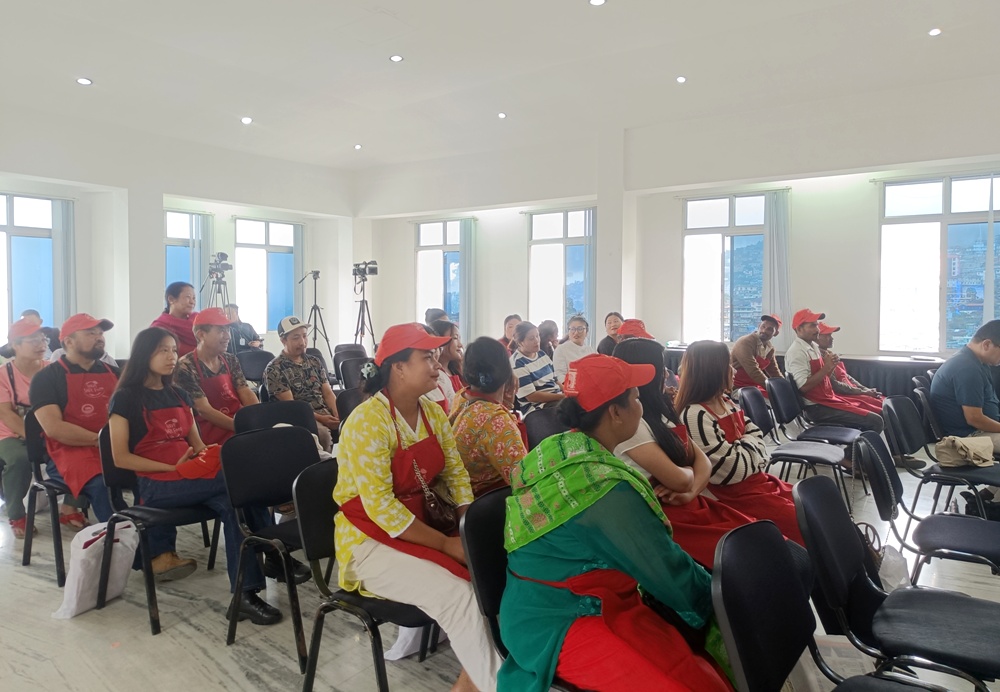Street vendors in Kohima trained on food safety and hygiene under Serve Safe Food project.
Share

KOHIMA — The project “Serve Safe Food” was launched in Kohima on Wednesday, following which street food vendors from the city were provided training through a programme organised by Nestlé India Limited in collaboration with the Food Safety Authority, Nagaland, and the National Association of Street Vendors of India (NASVI) at The Eastgate Hotel, Kohima.
During the inaugural programme, C Merenlemba, Assistant Food Safety Commissioner of Nagaland, encouraged the street vendors not to underestimate themselves but to take pride in their profession.
He reminded the vendors that the training and certificates were given with responsibility, and therefore they should implement everything they have been taught.
He appealed to them to practise good hygiene and good management systems so that they will be able to attract more customers.
He warned that if they do not practise proper hygiene, their business will not prosper. He also stated that they should take advantage of the training and certificates issued today because a time will come in the future when they will need to pay money to receive training and obtain certificates.
Chiradeep Auddy, senior manager, Branch Corporate Affairs, Nestlé India Ltd, said that the training focused on health aspects, food safety, and waste management. He stated that Nestlé has been providing training to food vendors, and, to date, they have trained more than 93,000 street food vendors.
Also read: Mhathung Yanthan stresses market linkages and grading for better crop prices
Sangeeta Singh, head of the Street Food Programme, NASVI, shared that they have been working exclusively with street vendors for the last 27 years across India and assured that they are committed to helping the street vendors.
She stated that the training basically reiterates things they already know and introduces things they may not be aware of. Thus, she urged them to implement in their business practices whatever they have learnt from the training.
Dr. J Kemp, State Programme Officer, FSSA, expressed gratitude to the organisers for undertaking this initiative to train street food vendors and create a safe environment for everyone.
He expressed his admiration for the street vendors and reminded them that the purpose of the training was to capacitate them so that they can be upgraded to another level. He noted that foodborne diseases will not arise through their business if they implement what is taught to them.
He said that the street vendors have a big impact on the local economy, and therefore “we are proud of the vendors”.
Keneisezo Azo, Kohima Municipal Council (KMC) councillor, said that the KMC has always prioritised public health, sanitation, and the well-being of citizens. He said that the street food vendors are not just food sellers but local entrepreneurs, playing a vital role in the urban economy by creating livelihoods for themselves and their families.
However, he said that with growth comes the responsibility to ensure that the food served is safe and hygienic, and that one key area requiring attention is waste management, an act of civic responsibility.
He assured that the KMC will continue to support efforts that empower and uplift street vendors. Thus, he encouraged everyone to take the training seriously because food safety is not just a rule made by the government but an act of love and respect for customers, family, and their own health. He also added that the KMC is making efforts to set up a permanent place for the street vendors.
“Today training will give you the knowledge and practical skill that will protect your business, gain the trust of your customers and even open new opportunities for their future. You are the pride of our streets, and let your food reflect your dignity”, he stated.
Kezha Yim, Designated Officer of Food Safety, Kohima zone, highlighted that the project “Serve Safe Food” is a good opportunity for street vendors. He also stressed the do’s and don’ts to the vendors, such as obtaining food safety registration and medical fitness certificates, as well as using headgear, gloves, aprons, clean water, and keeping dustbins beside their stalls to manage waste.